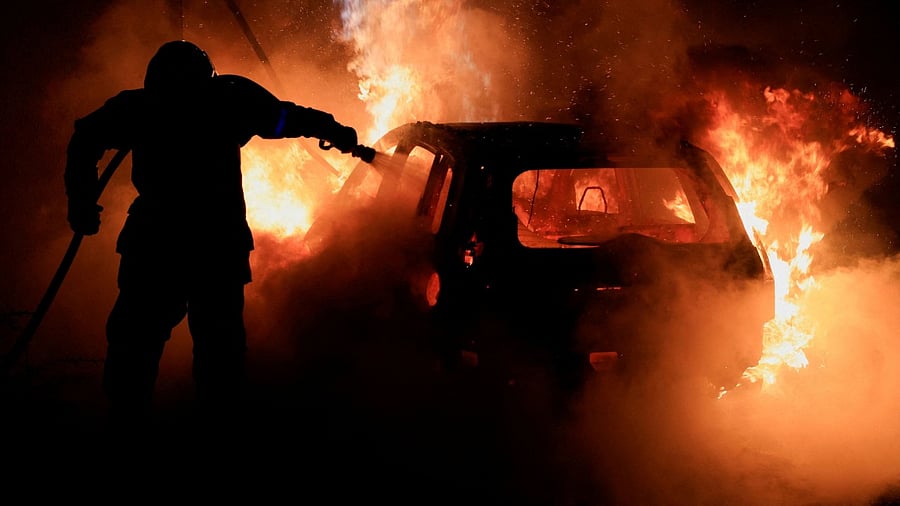
On June 27, a French police officer shot and killed a 17-year-old French citizen of Algerian descent, Nahel Min the working-class neighbourhood of Nanterre, Paris suburb during a traffic stop. According to reliable news sources, Nahel M and two other teenagers were driving a rented Mercedes in a bus lane when two police officers asked them to stop. When the car had stopped at a traffic light, the two police officers had accosted them and one of them struck Nahel with the butt of his pistol. At this point, Nahel had sought to drive off when he was shot.
The police officer has been detained and charged with voluntary homicide. The victim had previously come to the attention of the police for a driving license violation but did not have a criminal record.
In the aftermath of his death, widespread rioting swept across parts of Paris and several other French cities. The government, responding to the rioting, has deployed as many as 40,000 police leading to the arrest of at least 3,000 rioters.
Despite the anger and violence sweeping major urban areas, the government will no doubt quell the disturbances before long. However, the outbreak of this form of extensive rioting across much of the country raises important questions. Why the death of this teenager abruptly triggered such anger amongst such large swaths of the Algerian immigrant community not only in the banlieues of Paris, areas which are not within the proper ambit of the city but elsewhere in the country?
Those familiar with France in general, and Paris in particular, would know that these banlieues are mostly the home of working-class immigrants, often the site of neglected public housing with high rates of unemployment and, often, concomitantly high rates of crime. Worse still, the lack of adequate employment often leads some members of these communities to resort to a life of crime including drug-running. In some of these areas, anecdotal evidence suggests, even the police are reluctant to enter them given the existence of criminal gangs who tend to dominate these neighborhoods.
Beyond these blighted urban areas, the police in France as well as a number of European countries have long had an antagonistic relationship with non-white immigrants. In part, police hostility toward these communities stems from a general societal dislike and prejudice toward non-white immigrants from their former colonies.
According to a recent study that the French National Centre for Scientific Research (CNRS) conducted, French citizens of African origin are 11.5 times more likely to encounter tougher treatment at the hands of the police for the same crimes as white French citizens. The same study also revealed that those of Arab origin are 7 times as likely to face harsh treatment than their white counterparts. Beyond this in-built xenophobia, several other problems also plague French policing.
Amongst other matters, US-based Human Rights Watch has documented that French police apparently resort to routine ethnic profiling. Given the presence of a sizeable non-white immigrant community especially from former French colonies in North Africa, such practices lead the police to routinely harass young men on the mere suspicion of illegal activity. This form of surveillance and bullying on the part of the police, in turn, breeds distrust and anger on the part of immigrant communities thereby creating a deeper rift between them and law enforcement authorities.
Several criminologists and sociologists have shown that certain policing norms in France, unlike in the United Kingdom, and especially Germany, emphasize the restoration of public order over the need to de-escalate fraught situations. This approach to policing, almost invariably, leads to a spiral of conflict as aggrieved individuals respond to harsh tactics with anger and violence. Worse still, some spectacular incidents of violence that members of immigrant communities have committed against individual police officers have only hardened police attitudes and reinforced the perceived need to restore order at all costs. In turn, right-wing political parties which are hostile toward non-white immigrants in the first place, have expressed no qualms about hard-bitten police tactics. On the contrary, they are more than inclined to laud them and, in fact, ready to boost them.
The death of the young man was, no doubt, regrettable and very possibly avoidable. The rioting and wanton acts of violence, that followed in the wake of his death, obviously cannot be condoned. That said, the outbreak of violence that has come to haunt France in the wake of this incident is the portent of a deeper, more profound social malaise. Long after the rioting subsides the underlying issues that triggered the rioting will remain. Another similar incident will serve as yet another catalyst for a similar recrudescence of violence. Simply responding to a similar outburst with a display of force will quell the conflagration. No rioters, regardless of the depths of their pent-up anger, will prove to be a match for the might of the French state.
If France, with its defining national motto of liberté, egalité and fraternité, continues to fail to extend these noble principles to over 7 million immigrants or slightly over 10 per cent of its population, especially those who are of either Arab or African origin, it will simply continue to sit on a veritable powder keg. Another incident of the order that set off this round of rioting will simply trigger a spate of similar collective violence. The sooner the country comes to terms with these endemic problems that plague it the greater the likelihood that it will be able to maintain sustainable social order. Refusing to come to terms with these long-simmering issues will merely defer the day of reckoning.
(The writer is a Distinguished Professor of Political Science at Indiana University, Bloomington, USA).